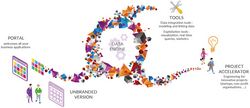Ozwillo brings public services together in a single, online platform
In 2016, many regions of Europe still see their citizens and businesses faced with the difficulty or even impossibility of finding information and services provided by local public authorities on the internet — and where they can, this information is often segmented in a counter-intuitive manner. ‘Public players are still in the culture of power associated with information retention. They have not yet assimilated the ongoing change of context where information sharing creates value, makes it more efficient by enabling collaborative work, and allows for saving money that would otherwise be spent in management or legal issues,’ says Bruno Thuillier, coordinator of the OASIS (Openly Accessible Services and Interacting Society) project which gave birth to Ozwillo. With his peers, Thuillier argues that federating services in a unique environment will enable public administrations to make better use of customer and business information and to adapt public services (e-services) so that they better meet their needs. He expects this will result in more accessible, more user-friendly, more efficiently run and less expensive services. These ideas came to fruition with Ozwillo, which took advantage of open platforms and cloud architecture to provide an initial set of 12 applications to citizens, public authorities and businesses. ‘We first chose applications to work out a complete chain of dematerialization. But we could not adapt all of them because providers of financial management, human resources, billing, etc. work with software that can not be moved to the cloud without being completely re-developed,’ Thuillier recalls. ‘So our selection has evolved to include a large panel of use cases, from tourism to economic development, public procurement, short circuit, participatory mapping, etc. At the end of the pilot we had 26 applications, which was much more than expected.’ Post, share and get inspired The scalable data infrastructure at the heart of Ozwillo allows applications to post, retrieve and share data. ‘Business applications used by public bodies can be adapted to the Ozwillo platform by service providers only once, with no need to develop connections with each of the other applications. It means data sharing can take place directly and automatically between applications, except for personal data that are shareable only on the initiative of the individual concerned,’ Thuillier explains. The data is semantically linked together and with particular data repositories such as ISO, Eurostat, National Statistical Institute etc. One example of Ozwillo application is ‘Agrilocal’, a French public procurement platform for local school catering. Local producers accept to open their data (organisation details, production, …) to local public authorities (Chamber of Agriculture, County Council), forming the most updated common database of the territory. This is reused in other applications such as InvProm, a Turkish application for the management of activity areas. Another example is the Spanish application ‘Environmental Incidents Management’ that aims to collect and process citizen reports on road incident. It is compatible with the use of a French mobile application named Javise which allows citizens to report incidents to different public authorities. This compatibility can also inspire public authorities to create brand new applications by the data shared by other users. Continued development Ozwilo may already be used by over 250 organizations and more than 1500 individuals, but Thuillier and his team do not intend to stop there. The platform continues to benefit from funding from the French government, new applications are expected and an association was created that brings together half of the members of the OASIS consortium along with new public members and private individuals. A first private investor also joined Ozwillo to foster its development and, last but not least, the first contracts with application providers have been signed. ‘We conducted two market studies and established a roadmap for the gradual development of services around the management of data,’ Thuillier says. ‘Since then, we have adapted our communication and associated new partners such as FNCCR, a French national union of public bodies managing networks (electricity, gas, oil, Internet), to facilitate data management from connected objects and IoT. Smart cities is a strategic market for Ozwillo.’ A co-built project with an intermunicipal union representing 260 public bodies in the south of France was also initiated to create an unbranded version of the Ozwillo portal for the regional territory of Alpes Provence-Alpes Côte d'Azur (PACA Region). Thuillier is confident that all these improvements will directly benefit all partners and regions in Europe.
Keywords
Online services, e-services, public authorities, open platforms, cloud architecture

